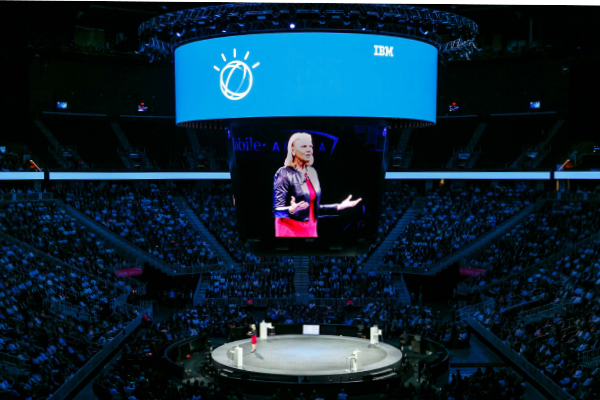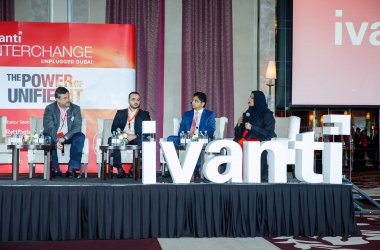
Glesni Holland reports from World of Watson 2016 in Las Vegas, where IBM executives unveiled the latest innovations in cognitive computing and demonstrated the impact that Watson can have – and is already having – on some of the world’s most important industries.
Over 17,000 people descended on Las Vegas’ Mandalay Bay Hotel to attend the second annual World of Watson conference last month. A significant proportion of those attendees packed into the T-Mobile Arena on day three of the event to eagerly await IBM CEO Ginni Rometty’s keynote appearance. In the lead up to her speech, IBM had already presented numerous ways in which the powerful platform could alter the world as we know it. One particular highlight was the unveiling of the first cognitive vehicle – better known as ‘Olli’ – which seats 12 passengers and utilises Watson’s IoT technology.
Rometty kicked off proceedings by claiming that Watson is the world’s leading AI platform for business. “When it comes to AI, we believe that the end goal is what matters, and our goal is to achieve augmented intelligence in a world with both man and machine,” she said. She went on to stress that the protection of data within such a platform is of the upmost importance, and something that made the company “sit up and pay attention” when designing the product. “Think of Watson as the place where your data goes to learn, and comes back home to you smarter, and to nobody else,” she said.
The security of this data – along with the ethics, transparency and privacy surrounding it – were key anxieties that Rometty outlined as affecting the adoption of AI technology. “We need to address some of the concerns around AI; these worries come with any new technology, and I am unfortunately old enough to remember all of them,” she quipped. “This is why we have formed an alliance called ‘Partnership on AI’ with Facebook, Google, Amazon and Microsoft, which conducts research, recommends best practices and publishes findings around these anxiety areas. We have already seen the impact of this technology, and it will soon far outweigh these worries,” she said.
Watson has very quickly become a household name since its appearance on the ‘Jeopardy’ gameshow back in 2011, when it wowed the tech industry with its victory over the shows two best players. Since then, Watson’s profile has soared, and its capabilities are now impacting a wide range of industries on a daily basis, such as transportation, education and healthcare.
A partnership between General Motors and IBM was announced during Rometty’s keynote, to bring the power of OnStar and Watson together to create OnStar Go – the auto industry’s first cognitive mobility platform. This hopes to enhance drivers’ experiences by avoiding traffic when you’re low on fuel, then activating a fuel pump and paying from the dashboard; ordering a cup of coffee on the go; or getting news and in-vehicle entertainment tailored to your personality and location in real time.
This announcement coincided with a number of other revelations at Rometty’s session, including the unveiling of Watson’s ‘Teacher Advisor,’ which is said to help match teaching materials with an individual student’s needs. John King Jr, US Secretary of Education, who was present on stage for this announcement, said, “This ability for technology to build knowledge to enhance teaching potential is a great capability.”
On the entertainment front, World of Watson 2016 also welcomed Grammy award-winner Alex Da Kid on stage to discuss how he and Watson joined forces to make cognitive music.
Watson analysed the last five years of culture and music data to uncover new emotional insights to augment Alex’s creative process. “I always say I don’t play instruments that well, but I can play the laptop extremely well,” the music producer said. “Technology is paramount to my process, and being able to collaborate with Watson just took everything to another level.”
Perhaps the most enthralling announcement of the afternoon involved IBM’s recent partnership with Teva Pharmaceuticals. Professor Yitzhak Peterburg, chairman of the board of directors at Teva, announced that the partnership would involve video call consultations between patients and healthcare professionals, as well as facilitating the introduction of 3D-pill printers and IoT medication dispensers equipped with consumption verifiers; all available from inside a patient’s home. There are also plans to introduce cognitive asthmatic inhalers.
“By leveraging our smart cloud connected technology, we can provide patients with technology to better understand their healthcare,” said Peterburg. “Together with IBM Watson, we are proud to announce a new joint project which aims to warn people of an imminent asthma attack up to six hours before it occurs by sending an alert to their smartphone. This can prevent unnecessary trips to the hospitals, cut costs, and allow patients to get on with their lives.”
Meanwhile, demonstrations took place at the ‘Cognitive Concourse’ to showcase the language, speech, visionary and sympathy characteristics that Watson could interpret, whilst attendees were also able to experience cognitive computing first-hand in practical exhibitions involving VR and a ‘Cognitive Professionals Escape Room.’
Rometty concluded her keynote appearance with the expectation that over the next five years, almost every decision we make will involve Watson AI. “Together, we are changing the world,” she said. “But boy, this is just the beginning.”





